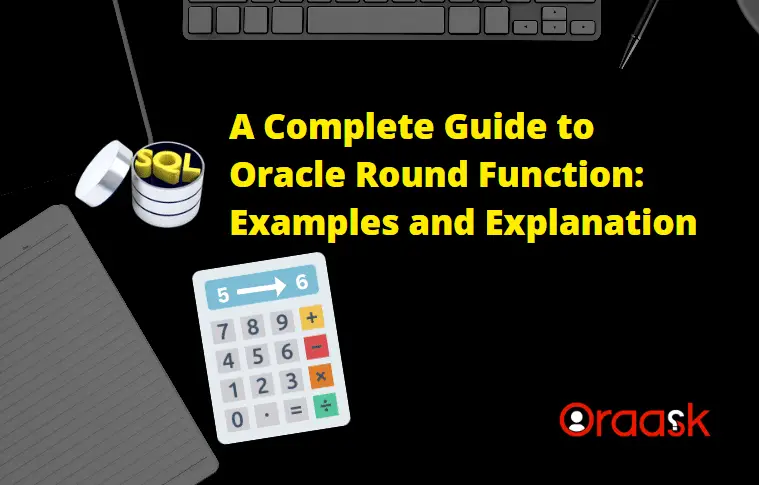How Can We Help?
Introduction:
In Oracle SQL, the Round Function is used to round off numeric values to a specified number of decimal places. It is one of the most commonly used functions in SQL when it comes to performing calculations involving decimal values. The Oracle Round Function takes two parameters: the number to be rounded and the number of decimal places to round to.
In this article, we will dive deep into the Oracle Round Function and explore its syntax, examples, and usage in different scenarios.
[adinserter name=”Block 1″]
Syntax of the Oracle Round Function:
The syntax of the Oracle Round Function is straightforward:
ROUND(number, [decimal_places])The ROUND function takes two parameters: the number you want to round and the number of decimal places to which you want to round it.
Parameters of Oracle Round Function:
[adinserter block=”2″]
Let’s take a closer look at the two parameters of the Oracle Round Function:
number: This is the number you want to round.
decimal_places: This parameter is optional. The ROUND function will round to the nearest integer if you don’t specify it. The function will round to that number of decimal places.
Examples of Using Oracle Round Function:
Now that we understand the syntax and parameters of the Oracle Round Function, let’s look at some examples.
Let’s say we have the following table:
CREATE TABLE grades (
student_name VARCHAR2(50),
grade NUMBER(3,1)
);
INSERT INTO grades VALUES ('Selim', 89.4);
INSERT INTO grades VALUES ('Sara', 92.7);
INSERT INTO grades VALUES ('Michael', 78.9);Example 1: Rounding to the nearest integer:
If we want to round each student’s grade to the nearest integer, we can use the following query:
SELECT STUDENT_NAME, ROUND (GRADE)
FROM GRADES;Output:
| STUDENT_NAME | ROUND(GRADE) |
|---|---|
| Selim | 89 |
| Sara | 93 |
| Michael | 79 |
[adinserter block=”3″]
Example 2: Rounding to a specific decimal place:
Let’s say we want to round each student’s grade to one decimal place. We can modify our query as follows:
SELECT STUDENT_NAME, ROUND (GRADE, 1)
FROM GRADES;Output:
| STUDENT_NAME | ROUND(GRADE, 1) |
|---|---|
| Selim | 89.4 |
| Sara | 92.7 |
| Michael | 78.9 |
Example 3: Rounding up or down:
By default, the ROUND function rounds to the nearest integer. However, we can also use it to round up or down.
To round up, we can use the CEIL function, which stands for “ceiling” For example:
SELECT CEIL (3.14)
FROM DUAL;[adinserter block=”4″]
Output:
| CEIL(3.14) |
|---|
| 4 |
To round down, we can use the FLOOR function, which stands for “floor.” For example:
SELECT FLOOR(3.14)
FROM dual;Output:
| FLOOR(3.14) |
|---|
| 3 |
Example 4: Using with Aggregate Functions
Suppose we have a table of sales data with columns for the sale date, the sale amount, and the salesperson who made the sale. We can use the ROUND function with the AVG aggregate function to find the average sale amount rounded to two decimal places for each salesperson.
Consider the following example:
CREATE TABLE sales (
sale_id NUMBER,
sale_date DATE,
sale_amount NUMBER(10,2),
salesperson VARCHAR2(50)
);
INSERT INTO sales (sale_id, sale_date, sale_amount, salesperson)
VALUES (1, '01-JAN-22', 1234.56, 'Selim');
INSERT INTO sales (sale_id, sale_date, sale_amount, salesperson)
VALUES (2, '02-JAN-22', 2345.67, 'Selim');
INSERT INTO sales (sale_id, sale_date, sale_amount, salesperson)
VALUES (3, '01-JAN-22', 3456.78, 'Ahmed');
INSERT INTO sales (sale_id, sale_date, sale_amount, salesperson)
VALUES (4, '02-JAN-22', 4567.89, 'Ahmed');In this example, we create a table named “sales” with four columns: sale_id, sale_date, sale_amount, and salesperson. We insert four rows of sales data, with two sales made by John and two sales made by Jane.
We can then use the following query to find the average sale amount rounded to two decimal places for each salesperson:
[adinserter block=”5″]
SELECT salesperson, ROUND(AVG(sale_amount), 2) AS avg_sale_amount
FROM sales
GROUP BY salesperson;Output:
| SALESPERSON | AVG_SALE_AMOUNT |
|---|---|
| Selim | 1790.12 |
| Ahmed | 4012.34 |
In this example, we use the AVG function to find the average sale amount for each “salesperson“, and then we use the ROUND function to round the result to two decimal places. The result is grouped by “salesperson” using the GROUP BY clause, which ensures we get each salesperson’s average sale amount separately.
Performance Considerations
While the ROUND function is a powerful tool for manipulating numeric data in Oracle SQL, it’s essential to consider its impact on performance when working with large datasets. In this section, we will explore some performance considerations to keep in mind when using the ROUND function.
One crucial factor to consider is the precision of the data you are working with. The ROUND function can be computationally expensive when working with high-precision data, such as numbers with many decimal places. In such cases, using the TRUNC function to remove decimal places may be more efficient than rounding the data.
Another consideration when working with the ROUND function is the order of operations in your SQL queries. In some cases, it may be more efficient to apply the ROUND function to individual rows of data before performing aggregate functions rather than rounding the result of the aggregate function.
[adinserter block=”6″]
Common Mistakes to Avoid:
When using the Oracle Round Function, there are a few common mistakes to avoid:
- Forgetting to include the ROUND keyword: Make sure you include the word “ROUND” in your query, or else Oracle will not recognize it as a function.
- Forgetting to specify the number of decimal places: If you want to round to a specific number of decimal places, make sure you include that value as the second parameter of the ROUND function.
- Rounding too often: Rounding numbers too often can result in inaccurate data. Try to avoid rounding until the very end of your calculations.
FAQs About the Oracle ROUND Function:
Q: What happens if I specify more decimal places than the number actually has?
A: Oracle will add zeros to the end of the number until it has the specified number of decimal places.
Q: Can I round negative numbers?
A: Yes, you can round negative numbers using the ROUND function.
Q: Can I use the ROUND function with non-numeric data types?
A: No, the ROUND function only works with numeric data types.
[adinserter block=”7″]
Final Thoughts
The Oracle Round Function is a powerful tool that allows you to round numbers to the nearest integer or to a specific number of decimal places. By understanding its syntax, parameters, and examples, you can become a master of rounding in Oracle SQL. Just remember to avoid common mistakes and be careful not to round too often. With these tips in mind, you’ll be well on your way to becoming an Oracle SQL expert.




